|
|
|
Sort Order |
|
|
|
Items / Page
|
|
|
|
|
|
|
| Srl | Item |
| 1 |
ID:
128326
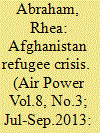

|
|
|
|
|
| Publication |
2013.
|
| Summary/Abstract |
Migration has been a regular concept in the history of Afghanistan where nomads roamed the land in search of basic necessities, while parents sent their young sons to trading centre for business and employment. Also, internal dislocation among families during conflict and tribal feuds has been a major cause of migration became predominant in and around Afghanistan with the need for development and better living standard forcing locals to migrate internally and externally. Over the years, pashtuns as the major ethnic group, spread out in large numbers, and other ethnic group, spread out in large numbers, and other ethnic groups such as the Hazaras crossed in to Iran also took place regularly, culminating in an exchange of cultural, religious and ethnic migratory routes.
|
|
|
|
|
|
|
|
|
|
|
|
|
|
|
|
| 2 |
ID:
098334
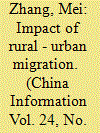

|
|
|
|
|
| Publication |
2010.
|
| Summary/Abstract |
As a result of China's marketization in recent years there has been an enormous number of rural-urban migrants. Based on a case study in poor villages on the Loess Plateau of central China, and referring to the overall framework of migration theories, this article examines the social and economic characteristics of migrants and their households, and discusses to what extent rural- urban migration contributes to the social and economic development of the migrant-sending areas, especially in reducing poverty
|
|
|
|
|
|
|
|
|
|
|
|
|
|
|
|
| 3 |
ID:
147439
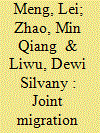

|
|
|
|
|
| Summary/Abstract |
In this paper we investigate whether it is empirically important to take into account the joint migration behavior of couples when examining married individuals' migration decisions in rural China. According to the National Bureau of Statistics of China (2011), more than half of rural migrant workers are married. Married couples' migration decisions are not purely individual responses to different social and economic opportunities, but jointly determined within a family unit. The current approaches that examine Chinese migration issues do not explicitly take into account the fundamental differences between personal and family decisions. We extend the current approaches to explicitly model joint migration decisions of married couples. Using the 2009 China data from the Rural–Urban Migration in China and Indonesia (RUMiCI) project, we examine the important determinants of couples' temporary migration decisions, such as the numbers of pre-school and school-age children. Our simulation and estimation results show that when analyzing married persons' migration choices, it is more desirable to use a multiple-choice model than a binary-choice model because 1) it more effectively deals with nonlinearities created by joint decision-making; and 2) it offers the possibility to study compositional change of joint migration outcomes.
|
|
|
|
|
|
|
|
|
|
|
|
|
|
|
|
| 4 |
ID:
076886
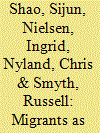

|
|
|
|
|
| Publication |
2007.
|
| Summary/Abstract |
The problem of a shortage of migrant labor is a new development in China's coastal provinces. We discuss the reasons for this emerging phenomenon using a conceptual framework that extends the traditional Lewis dualistic labor market model to incorporate a migrant labor market. We emphasize that migrant labor shortage in China not only reflects a declining wage gap between what peasants receive and what migrants can earn in the cities, but also the institutional legacies of the planning era such as the hukou (household registration) system which discriminates against migrants vis-a-vis urban residents in terms of access to social insurance and other social services. We proceed to draw on a unique survey of migrants and urban residents collected in Jiangsu to show that migrants receive lower incomes, and they have poorer access to social insurance than those with an urban registration in China's cities. Our findings have important implications for the alleviation of the migrant labor shortage problem
|
|
|
|
|
|
|
|
|
|
|
|
|
|
|
|
| 5 |
ID:
159033
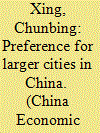

|
|
|
|
|
| Summary/Abstract |
China has long aimed to restrict population growth in large cities but encourages growth in small and medium-sized cities. At the same time, various government policies favor large cities. We conjecture that larger cities in China offer a better quality of life and more opportunities. We thus predict that a typical rural-urban migrant is willing to give up some income in order to live in a larger city. We present a simple model in which rural-urban migrants choose destination cities to maximize utilities from consumption and urban amenities. Drawing data from a large-scale population survey conducted in 2005, we first estimate each migrant's expected earnings in each possible destination city using a semi-parametric method to correct for potential selection bias. We then estimate the typical migrant's preference for city population size, instrumenting population size with its lagged values to control for potential omitted-variables bias. From these estimation results, we calculate the typical migrant's willingness to pay to live in larger cities. Our results show that indeed rural-urban migrants strongly prefer cities with larger populations. We explore possible explanations for this preference and discuss the implications of these findings.
|
|
|
|
|
|
|
|
|
|
|
|
|
|
|
|
| 6 |
ID:
109109
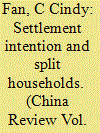

|
|
|
| 7 |
ID:
161772
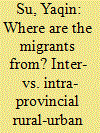

|
|
|
|
|
| Summary/Abstract |
Using a representative sample of rural migrants in cities, this paper investigates where the migrants in urban China come from, paying close attention to intra-provincial vs. inter-provincial migrants, and examining the differences in their personal attributes. We find that migrants who have come from within the province differ significantly from those who have come from outside of the province. Using a nested logit model, we find that overall, higher wage differentials, larger population size, higher GDP per capita, and faster employment growth rate are the attributes of a city that attract rural-to-urban migrants. In addition, moving beyond one's home province has a strong deterrent effect on migration, analogous to the “border effect” identified in international migration studies. We also explore the role of culture, institutional barriers, and dialect in explaining such a pronounced “border effect”.
|
|
|
|
|
|
|
|
|
|
|
|
|
|
|
|
|
|
|
|
|